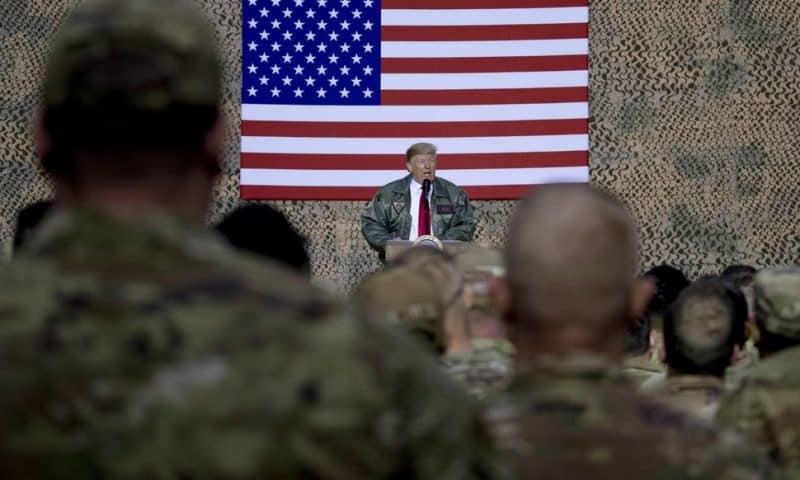The withdrawal from the contentious region comes as President Donald Trump seeks foreign policy wins ahead of the November election.
THE U.S. WILL ALMOST halve the number of forces it has in Iraq by the end of the month, the top military officer for the region said Wednesday, aligning with President Donald Trump’s attempts leading up to the November election to follow through on key campaign promises to withdraw the U.S. from “endless wars.”
Marine Gen. Frank McKenzie, commander of U.S. Central Command, said the number of U.S. forces in Iraq would drop from 5,200 to 3,000 before the end of September. Having first deployed to Iraq in 2003, the U.S. fully withdrew in 2011 as a part of the Obama administration’s similar pledge to end wars, only to have to redeploy thousands of forces in 2014 following the dramatic rise of the Islamic State group.
McKenzie said Wednesday that the service members that will remain will advise local forces in their continued fight to rid pockets of the Islamic State group, also known as ISIS, from Iraq and neighboring Syria.
“In recognition of the great progress the Iraqi forces have made and in consultation and coordination with the government of Iraq and our coalition partners, the United States has decided to reduce our troop presence in Iraq from about 5,200 to 3,000 troops during the month of September,” McKenzie said in a speech in Iraq, parts of which Central Command released.
Trump hinted at the withdrawal announcement last week when speaking with reporters aboard Air Force One. He also said a similar announcement regarding the U.S. troop presence in Afghanistan would follow in the coming days.
The threat from the Islamic State group remains, particularly in Syria where the insurgent group continues to exploit domestic unrest. A few hundred U.S. forces remain in northeast Syria, ostensibly to control lucrative oil fields there, despite Trump’s previous orders for a full withdrawal from that country as well.
U.S. officials have also seen their presence in Iraq as a key bulwark against Iranian influence there – aligning with the “maximum pressure” campaign the Trump administration has waged against Tehran.
McKenzie said Wednesday that the decision represents “a clear demonstration of our continued commitment to the ultimate goal, which is an Iraqi security force that is capable of preventing an ISIS resurgence and of securing Iraq’s sovereignty without external assistance.”
“The journey has been difficult, the sacrifice has been great, but the progress has been significant,” he said.
Tensions have remained high in Iraq in recent months, particularly following Trump’s decision to kill influential Iranian military commander Qassem Soleimani in a drone strike outside Baghdad International Airport in early January, along with pro-Iranian Iraq militia leader Abu Mahdi al-Muhandis. The strike prompted outrage from Iraqi leaders, many of whom called for the U.S. to withdraw, and brought the U.S. to the brink of war with Tehran.
Days later, top Pentagon officials including Defense Secretary Mark Esper were forced to deny the U.S. was indeed pulling out all forces after a letter emerged from a senior U.S. commander that seemed to imply a full withdrawal.
“We are in Iraq, and we are there to support Iraqi forces and the Iraqi government to become a strong, independent and prosperous country,” Esper said at the time.
The U.S. hinted last at a new posture in its contributions to the war against the Islamic State group following a meeting between Secretary of State Mike Pompeo and his Iraqi counterpart, Foreign Minister Fuad Hussein. An Aug. 19 agreement to continue economic support for Iraq also included stipulations of a “new phase” in the conflict against the insurgent network based on “training, supporting, and equipping” Iraqi security forces.
McKenzie in August warned against a full U.S. withdrawal from its war against the Islamic State group, citing the potential for extremist recruiting among the massive levels of displaced people and refugees from decades of war. That threat, particularly in Syria, will persist for at least a decade, he said.
“The future, particularly in Syria, is not going to be bloodless, or in Iraq, either,” McKenzie said Aug. 12 at an event organized by the U.S. Institute of Peace.

